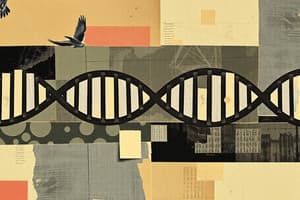Podcast
Questions and Answers
What is the primary process by which normal cells become cancer cells?
What is the primary process by which normal cells become cancer cells?
- Mutation
- Apoptosis
- Carcinogenesis (correct)
- Cell division
Which of the following most directly contributes to the activation or alteration of gene expression in carcinogenesis?
Which of the following most directly contributes to the activation or alteration of gene expression in carcinogenesis?
- Repeated exposure to factors (correct)
- Dietary habits
- Genetic predisposition
- Physical activity
Which type of genes is responsible for the promotion of programmed cell death?
Which type of genes is responsible for the promotion of programmed cell death?
- Oncogenes
- Apoptosis genes
- Tumor suppressors (correct)
- DNA repair genes
What is one of the consequences of changes in cell DNA in relation to cancer?
What is one of the consequences of changes in cell DNA in relation to cancer?
Which factors are involved in the process of carcinogenesis?
Which factors are involved in the process of carcinogenesis?
Flashcards are hidden until you start studying
Study Notes
Carcinogenesis
- Transformational process turning normal cells into cancer cells.
- Involves a sequence of changes over an extended period, indicating a gradual progression.
- Multiple factors or prolonged exposure to single factors contribute to cellular changes that may activate or alter gene expression.
Functions of Types of Genes
- DNA Repair Genes: Essential for fixing damaged DNA, preventing mutations that can lead to cancer.
- Apoptosis Genes: Control programmed cell death; malfunction may result in cells surviving with genetic damage.
- Oncogenes: Genes that, when mutated or overexpressed, promote cancer development by driving excessive cell growth and division.
- Tumor Suppressor Genes: Act as regulators that prevent uncontrolled cell growth; loss or inactivation can lead to tumor formation.
Implications of Changes in Cell DNA
- Alterations in DNA are closely linked to the onset of malignancies, highlighting the critical role of genetic changes in cancer progression.
Studying That Suits You
Use AI to generate personalized quizzes and flashcards to suit your learning preferences.




